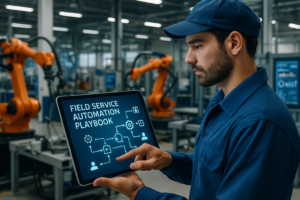
Artificial Intelligence (AI) has transcended its status as a futuristic concept and firmly established itself as a game-changer across a multitude of industries. From healthcare and finance to energy and utilities, AI is reshaping the way businesses operate and engage with their customers. In this era of digital transformation, understanding the potential of AI is crucial for organizations looking to stay competitive and meet the evolving needs of their clientele.
In today’s hyper-connected world, the customer experience reigns supreme. A remarkable 88% of customers now rank their interactions with a company as equally important as the products or services they offer—a record high. With years of escalating digital engagement, customers naturally assume that companies have an intimate understanding of their individual needs, especially given the wealth of personalized insights harvested from countless interactions. In fact, a substantial 73% of customers have come to expect nothing less than this level of personalized service, tailored to their unique needs and expectations.
To meet these soaring expectations on a large scale, companies are increasingly turning to a powerful ally: AI.
AI-Powered Transformation in Field Service Operations
AI revolutionizes field service operations by equipping technicians with the essential information required for the upkeep of vital infrastructure. According to the 2022 edition of Salesforce’s State of the Connected Customer report, field service has now evolved into a pivotal revenue stream. Strikingly, businesses spanning various sectors recognize field service as an emerging source of revenue, with a resounding 86% of decision-makers at field service-enabled companies deeming it crucial for business growth.
AI is a cornerstone for high-performing field service teams. A notable 8 out of 10 high-performing field service teams harness AI’s capabilities, in contrast to 62% of their underperforming counterparts. These top-tier field service teams adeptly utilize other technological tools as well, including chatbots (78%), workflow automation (83%), and automated digital transcription of phone conversations (80%). This technology-driven approach has a direct impact on elevating field service satisfaction levels. An overwhelming 93% of mobile workers within high-performing organizations cite job satisfaction as a significant benefit of field service management. They highlight enhanced productivity, optimized scheduling, increased job satisfaction, and better management of unforeseen challenges as key advantages.
AI in Energy and Utilities: Improving Efficiency and Sustainability
The energy and utilities sector is increasingly turning to AI to enhance efficiency and promote sustainability. In terms of energy and utilities, McKinsey & Company emphasizes the significant potential of AI and digitization, projecting an impressive 20% increase in asset productivity along with a sizable 10% decrease in maintenance costs. Moreover, AI’s advanced weather forecasting capabilities empower grid operators to predict the availability of renewable resources like wind and solar power, bolstering the reliability of energy networks.
This technology not only optimizes the utilization of existing resources but also proves invaluable in long-term infrastructure planning, delivering precise climate simulations for the next 10 to 20 years. AI-driven predictive maintenance plays a pivotal role in equipment monitoring and upkeep, effectively curbing downtime and costly repairs. Furthermore, the implementation of smart grids streamlines energy distribution, reducing waste and minimizing environmental impact. To top it off, AI-driven analytics provide in-depth insights into energy consumption patterns, facilitating superior resource allocation and demand management.
AI in Healthcare: Enhancing Patient Care and Diagnosis
In the realm of healthcare, AI is revolutionizing patient care and diagnosis. Machine learning algorithms can analyze vast datasets to identify trends and insights that human clinicians might miss. From medical imaging to predicting patient outcomes, AI is providing healthcare professionals with powerful tools to make more accurate and timely decisions. Patients benefit from quicker diagnoses, personalized treatment plans, and improved overall care.
AI in Manufacturing: Optimizing Operations and Quality Control
Manufacturing has embraced AI to enhance operations and maintain product quality. AI-driven quality control systems can identify defects or deviations in real-time, ensuring that only products meeting stringent standards reach consumers. Predictive maintenance keeps manufacturing equipment in peak condition, reducing downtime and maintenance costs. AI-based production optimization helps streamline processes, increase efficiency, and reduce waste. Manufacturers are leveraging AI to drive continuous improvement and ensure consistent product quality.
AI in Retail: Transforming the Customer Experience
In retail, AI is reshaping the customer experience. Recommendation engines analyze customer preferences and behaviors to provide personalized product suggestions. AI-powered chatbots offer instant assistance, guiding customers through their shopping journeys. Inventory management systems leverage AI to optimize stock levels and reduce waste. Retailers are using AI to create seamless omni-channel experiences, where customers can seamlessly transition from online to offline shopping.
AI Across Industries: The Common Thread
Generative AI retains its status as the leading emerging technology across various industries. According to KPMG, when surveyed in June 2023, 75% of business leaders expected it to be among the top three emerging technologies in the next 12–18 months. Similarly, in a March 2023 survey, 78% identified generative AI as the foremost emerging technology over the next 3–5 years. What unites diverse business sectors in the march towards implementing more AI is AI’s remarkable capacity to process vast datasets, uncover concealed patterns, and furnish actionable insights. AI-driven automation not only diminishes human error but also liberates employees to concentrate on more strategic responsibilities. Furthermore, AI’s potential remains in constant evolution, with advancements like natural language understanding (NLU) and reinforcement learning broadening its capabilities.
The Future of AI and Vertical Integration
As AI continues to mature, we can expect to see even greater integration across verticals. For companies like Youreka, which provide solutions across industries, AI offers the opportunity to create a unified ecosystem that leverages data and automation to deliver seamless, personalized, and efficient experiences.
AI is not just a technological advancement; it’s a transformative force that has the potential to redefine industries and elevate customer experiences. Organizations that embrace AI’s capabilities and harness its power will be better positioned to thrive in the digital age. The AI revolution is underway, and the possibilities are limitless.
Stay tuned for more insights as we explore the ever-expanding horizons of AI and its impact on industries worldwide.




